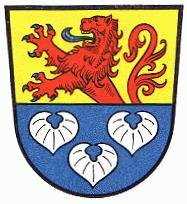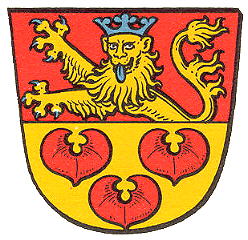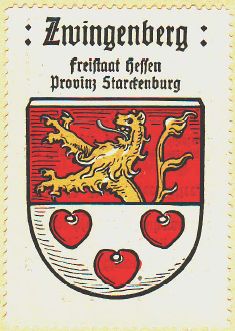Zwingenberg (Bergstrasse): Difference between revisions
Knorrepoes (talk | contribs) m (Text replace - "[[Literature" to "{{media}} [[Literature") |
Knorrepoes (talk | contribs) m (Text replace - "The arms in the Kaffee Hag albums +/- 1925 " to "The arms by Hupp in the Kaffee Hag albums +/- 1925 ") |
||
| Line 19: | Line 19: | ||
{|align="center" | {|align="center" | ||
|align="center"|[[File:zwingenberg.jpg|center]] <br/>The arms as shown in 1956 | |align="center"|[[File:zwingenberg.jpg|center]] <br/>The arms as shown in 1956 | ||
|align="center"|[[File:zwingenberg.hagd.jpg|center]] <br/>The arms in the [[Kaffee Hag albums]] +/- 1925 | |align="center"|[[File:zwingenberg.hagd.jpg|center]] <br/>The arms by [[Otto Hupp|Hupp]] in the [[Kaffee Hag albums]] +/- 1925 | ||
|} | |} | ||
Revision as of 07:46, 21 November 2014
| Heraldry of the World Civic heraldry of Germany - Deutsche Wappen (Gemeindewappen/Kreiswappen) |
ZWINGENBERG
State : Hessen
District (Kreis) : Bergstrasse
Origin/meaning
Zwingenberg got city rights in 1274 by King Rudolf. The city was a loan to the counts of Katzenelnbogen from the bishops of Mainz. The oldest seal probably was made in the end of the 13th century, but the oldest remaining copy dates from 1350. It shows already the present arms. The upper part shows the lion of Katzenelnbogen, the lower part probably signifies the position on the Neckar river (water lily leaves).
The composition of the arms never changed, the colours of the leaves on the other hand changed often. The colours were finally made official in 1963.
| The arms as shown in 1956 |
The arms by Hupp in the Kaffee Hag albums +/- 1925 |
Contact and Support
Partners:
Your logo here ?
Contact us
© since 1995, Heraldry of the World, Ralf Hartemink 
Index of the site
Literature : Stadler, 1964-1971, 8 volumes; Hessisches Wappenbuch; Kaffe Hag albums, 1930s













